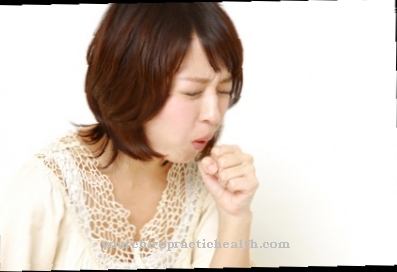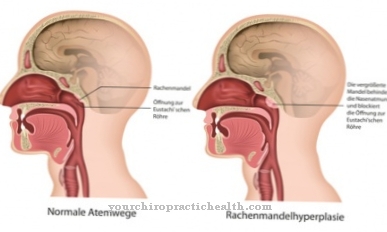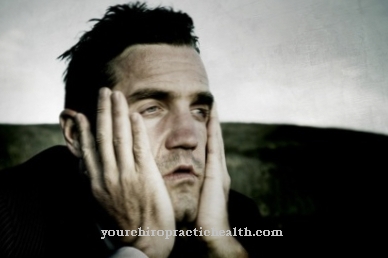A Burning in the chest mostly has organic, muscular, osseous (affecting the bones) or psychological causes. These can be threatening or harmless in nature. Treatment depends on the nature of the cause.
What is Chest Burning?

A burning sensation in the chest is an acute pain in the chest area. Ribs and sternum limit this area to the front. The spine limits it to the rear. It contains a large number of organs, including the heart and lungs.
A burning sensation in the chest can be caused by disorders of these organs as well as by tension, rib fractures or psychological factors. The affected person feels a locally limited burning sensation or a burning sensation that runs through the entire chest. Coughing, breathing problems or shortness of breath, tightness and nausea are common side effects of a burning sensation in the chest.
causes
The causes of a burning sensation in the chest can be many. They mostly affect the heart, lungs, digestive system, muscles or bones. Angina pectoris causes a burning sensation in the chest, as constricted coronary arteries do not supply the heart with sufficient blood.
This burning sensation subsides after a few minutes. If the coronary arteries are completely blocked, a heart attack occurs. This triggers a burning sensation in the chest, which can last longer as the disease progresses. The person concerned also suffers from fear of death. Malfunction of the heart valves can lead to a burning sensation in the chest, as can viral or bacterial pericarditis.
High blood pressure can cause a burning sensation in the chest that is similar to angina.
The lung disease bronchial asthma is a common cause of burning in the chest. The burning sensation is often associated with breathing. Other lung conditions that cause a burning sensation in the chest include pulmonary embolism, pneumonia, pneumothorax (caused by a tear in the pleura) and lung cancer.
Inflammation of the chest and middle skin can also cause a burning sensation in the chest.
The causes can also lie in the digestive system: a tear in the esophagus causes a burning sensation in the chest, as does heartburn. Simple sore muscles and tension in muscles in the back and chest area can result in a burning sensation in the chest, as can vertebral blockages, as well as rib fractures and bruises.
In addition to these physical causes, the burning sensation in the chest can also have psychological factors. Anxiety and stress can sometimes trigger symptoms that are similar to those of angina pectoris.
You can find your medication here
➔ Medication for chest painDiseases with this symptom
- Angina pectoris
- Heart attack
- Pulmonary embolism
- Reflux disease
- Pericarditis
- high blood pressure
- Lung cancer
- Bruised ribs
- bronchial asthma
- lung infection
- Pneumothorax
- pleurisy
Diagnosis & course
If there is a burning sensation in the chest, the doctor will first ask about the duration and type of pain. It is also of interest where and how often the pain occurs, which symptoms also exist and which activity triggers the pain.
In order to be able to diagnose heart diseases, the doctor will have an electrocardiogram (EKG) performed. The recording of an X-ray provides information about possible disorders in the lungs or injuries to the skeleton. A lungoscopy also supports the diagnosis of lung diseases.
Ultrasound scans will show if the heart is working and if fluids have built up in the abdomen. If there is a suspicion of disturbances in the digestive system, the doctor will perform a gastroscopy.
Complications
Burning in the chest can appear as a symptom of a wide variety of diseases and the possible complications are correspondingly diverse. If the pain occurs as a result of heartburn, the symptoms can intensify and even develop into reflux disease. A diaphragmatic hernia causes severe pain in the chest and can permanently damage the diaphragm. In the case of inflammation of the pancreas or gallstones, there is also a strong pulling in the chest, which can spread to the sternum and ribs.
If the symptoms are caused by damage to or disease of the spine, the bones can stiffen and the affected joints become inflamed. The rheumatic disease Bechterew's disease in particular leads to complications of this kind. Far-reaching complications are not unlikely with chest pain. In the case of shingles, which is noticeable by a pulling in the chest, it can lead to the well-known belt-shaped rash and the secondary diseases of herpes zoster if not treated.
Chest pain can also be a side effect of various organ diseases. If the heart is affected, possible complications include heart attack, high blood pressure, cardiac arrhythmias or pericarditis. If the lungs are affected, possible complications are various lung diseases such as pulmonary embolism, pneumonia or lung cancer. In the further course of the disease, mitral valve prolapse, aortic valve constriction or pleurisy can also occur.
When should you go to the doctor?
Burning in the chest is a symptom of many diseases and should always be taken seriously. It came to point to the reflux disease, but also to a heart disease. Burning in the chest, which is accompanied by shortness of breath and a feeling of pressure in the upper abdomen, is alarming. There is a risk of a heart attack. The sick person should be brought to the emergency doctor immediately.
More often, however, the burning sensation behind the breastbone arises as a result of acid eructation. Some of the stomach acid runs back into the esophagus and damages the mucous membrane. Heartburn is a widespread disease that affects more than 20 million people. Heartburn reduces the elasticity of the lower esophagus. If left untreated, it can develop into esophageal cancer. Reflux disease demands a lot of discipline from the patient, otherwise the symptoms will not improve.
In any case, persistent heartburn requires medical treatment and should lead to a change in diet. It is not uncommon for psychological problems such as anxiety attacks to cause burning and stinging in the chest. Here, too, the cause must be investigated. Acute bronchitis can show up as a burning sensation in the chest, but a cough and fever are more common. If there is also difficulty in breathing, the patient should see a doctor immediately. If the bronchitis does not heal properly, there is a risk of chronic lung disease.
Doctors & therapists in your area
Treatment & Therapy
The treatment of a burning sensation in the chest varies depending on the cause.
For angina pectoris, the doctor usually gives nitroglycerin. It lowers blood pressure and dilates the blood vessels so that the coronary arteries can supply the heart with blood again.
A heart attack represents an acute danger to life. The closed coronary arteries must be reopened immediately, which is achieved by means of a coronary angiography. Here a small balloon expands the affected vessel, after which a stent made of stainless steel is placed at the narrow point. It keeps the vessel open permanently. If the operation is not possible, vascular prostheses, the body's own veins or foreign arteries can bridge the blocked area (bypass operation).
A burning sensation in the chest caused by inflammation is treated with anti-inflammatory drugs. Bronchial asthma is also treated with medication.
The respective specialist treats the disease of the various organs. During one surgical procedure, a doctor can close a tear in the esophagus. Physiotherapy helps relieve tension and vertebral blockages.
Psychological causes such as fear and stress can be treated with relaxation exercises and possibly psychotherapy.
Outlook & forecast
A burning sensation in the chest or even a slight feeling of pressure in the chest can often cause stress. It is quickly associated with breast cancer, although it can have other causes as well. High blood pressure that has been ignored for a long time can make itself felt in the chest. If the burning sensation in the chest is temporary, it is often associated with stress. Chest burning sensations cannot be relieved adequately with pain relievers. The excessive intake also has a harmful effect on the kidneys and liver.
If you want to prevent a burning sensation in your chest in the future, you should make sure that you are not exposed to stress too often, both physically and mentally. This also includes giving the body the nutrients it needs to survive. Fast food and other fatty foods can make this feeling of pressure worse. Too little exercise or a change in movement can also be a cause and then be reflected in more serious illnesses. Only medical examinations can help here. You can do prevention against chest pain, but you can't do very much about the pain itself. If the pain does not subside over time, a visit to the doctor is urgently necessary.
You can find your medication here
➔ Medication for chest painprevention
Certain causes of a burning sensation in the chest can be prevented. A healthy diet helps keep the coronary arteries free from blockages. The intake of omega-3 fatty acids in particular minimizes the risk of heart disease, which can lead to a burning sensation in the chest.
Sufficient exercise also supports the blood flow to the coronary arteries. Quitting smoking helps prevent lung cancer. Staying away from fine dust and environmental toxins minimizes the risk of developing bronchial asthma. Regular exercise prevents tension in the muscles, which can trigger a burning sensation in the chest.
You can do that yourself
Burning chest pain can indicate harmless disorders, but it can also be a sign of a life-threatening illness. Such symptoms must therefore always be clarified by a doctor. If burning pain occurs briefly or during great physical exertion, especially during peak sporting activity, this is usually harmless. Athletes should, however, slowly increase their workload so as not to permanently overload the body.
Burning chest pain can also accompany a cold. Especially when the upper respiratory tract is severely dehydrated, the patient has the feeling that the entire chest cavity is on fire. In such cases, naturopathy recommends steam baths with chamomile tea or sea salt in order to re-moisten the dried out mucous membranes. Sage tea or lozenges are said to help if you have a strong cough.
Burning chest pains are also common as a result of a stomach ache. In addition to over-the-counter acid binders from the pharmacy, mild agents such as Bullrich salt, soda or healing earth help against severe heartburn. Frequent or severe heartburn should definitely be clarified by a doctor. If other stomach irritations are causing the severe burning sensation in the chest, a change in diet usually helps. Nicotine, high percentage alcohol, fatty foods and large amounts of animal protein must be avoided. On the other hand, light, low-fat and vitamin-rich vegetarian food is helpful.























.jpg)



